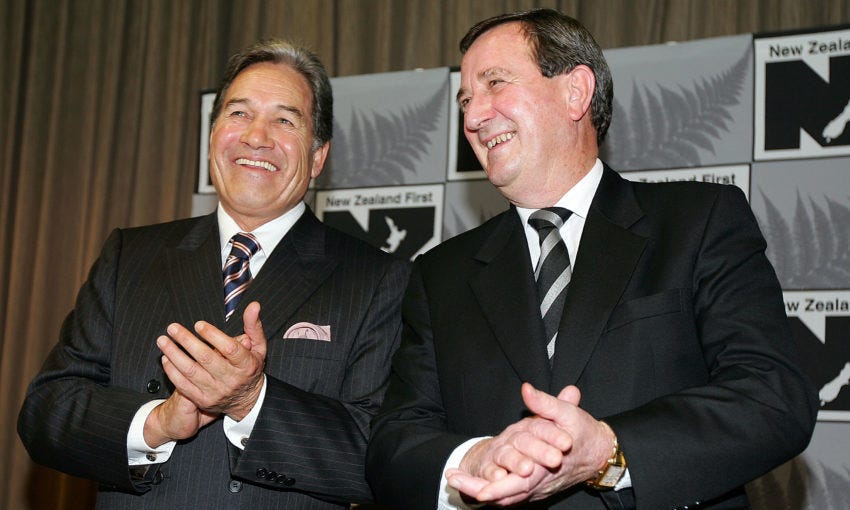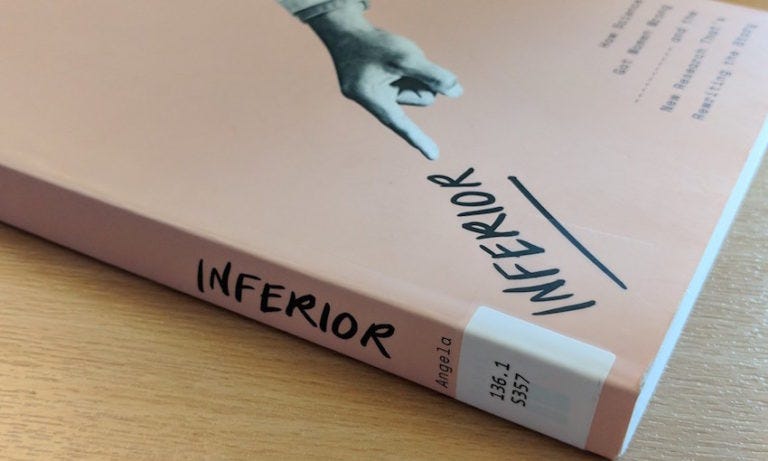Trust in question around NZ First Foundation investigation
The PM wouldn't give a straight answer to a direct question about her deputy PM.

Good morning and welcome to The Bulletin for Tuesday 11 February, by Alex Braae for The Spinoff. Presented in partnership with Z Energy.
In today’s edition: NZ First Foundation referred to police, major campaign launched to close measles immunity gap, and emissions forecast rises again.

(Image) Winston Peters, pictured with then MP Doug Woolerton who later went on to be an NZ First Foundation trustee, at the party conference in 2008. (Getty Images)
The story around donations to the NZ First Foundation has become a lot more serious, and both the police and Serious Fraud Office will be involved. It follows a fairly strong statement from the Electoral Commission, in which they said they "have formed the view that the New Zealand First Foundation has received donations which should have been treated as party donations for the New Zealand First Party. In the Commission’s view, the donations were not properly transmitted to the Party and not disclosed as required." They then referred the matter to the police for further investigation, to determine whether offences have been committed, who in turn referred it to the SFO.
NZ First leader Winston Peters has welcomed the news, and they say they will be reviewing their processes around party donations. In a statement Peters said he advised the party last week to refer the matter to police, which "does not imply any impropriety but is intended to ensure the party, as with all parties, have robust arrangements." Peters also released a statement on Sunday saying the party would be preparing a police complaint about a breach of private party data. They further argued that their donations system is the same as what other parties use.
However, an electoral law expert says there is clear evidence of – at the very least – something "very unusual taking place." Writing on The Spinoff, professor Andrew Geddis says with the documentation appearing to show foundation donations being funnelled to the party itself, "it was very hard to see how this activity could comply with the Electoral Act 1993’s mandates. Which is what the Electoral Commission has now concluded, having examined the matter for itself."
Politically, this is likely to be causing ominous rumblings around the government. Even though no charges have been laid, it raises questions around integrity and credibility of the parties running the country. As Toby Manhire reports, an example of this came at the PM's post-cabinet press conference yesterday. When asked if she could trust deputy PM Peters, "Ardern couldn’t muster a direct answer. There was no simple “yes”, not even one printed in large type on a square of paper. Instead she chose to stress what an “excellent working relationship” they enjoyed." One way or another, that question may have to be answered soon.
A brief message from Emily Writes, Parents editor at The Spinoff
Stories for and about parenting often lack humanity. They generally treat new mothers in particular as if they can no longer think for themselves. I’m proud to be part of a media organisation that encourages us to see each other and celebrate our differences as new parents, rather than pit us against each other for ‘engagement’ in imaginary ‘mommy wars’. If you want to support writing that pushes boundaries and encourages seeing the world in a less insular way, then please support The Spinoff by joining as a member.
A multi-million dollar campaign will be launched to bring measles vaccinations back up to the levels required to prevent outbreaks, reports the NZ Herald. Associate health minister Julie Anne Genter says the campaign will target a group of around 300,000 people aged 15-29 who aren't fully immunised, to close the 'immunity gap'. There will also be a focus on Māori and Pacific people, who are immunised at lower rates than the general population.
The country's greenhouse gas forecast for the year is now projected to include about a million more tonnes of carbon, reports Newsroom. Disappointingly, the figures also show we're nowhere near meeting targets set under the Paris Agreement. Greenpeace boss Russel Norman says the government needs to do much more than has currently been planned to decarbonise the economy.
A very high profile defamation case has started in Wellington this week. Prominent landlord Sir Bob Jones is suing filmmaker Renae Maihi for defamation. It all started when the latter started a petition calling for him to be stripped of his knighthood, after Sir Bob wrote an NBR column saying that instead of Waitangi Day there should be a "Māori Gratitude Day" in which Māori people mow the lawns and so on for Pākehā, to thank them for colonisation. As this report from The Spinoff's Leonie Hayden shows, it was just one of many instances of Sir Bob Jones making statements in print that could be interpreted as racist. Radio NZ has an account of the first day of proceedings, in which Sir Bob himself took the stand and defended his column as merely tongue in cheek.
The drought in Northland in particular is getting really bad. This Stuff story captures some of the measures being taken in far North towns, some of which might quite literally run dry soon if there isn't rain. I've put together a cheat sheet on the wider situation around the country, and how this will be an increasingly common occurrence through climate change. Incidentally, if you live in Auckland – we need to start being a lot more conscientious about water use to avoid restrictions coming in. At the moment the main recommendation is that you cut shower length to no more than four minutes.
Here's an interesting infrastructure story with implications for a whole lot of other things around Auckland: Business Desk (paywalled) reports the International Federation of Airline Pilots Associations has issued a safety warning around the tarmac at Auckland Airport, and told pilots to have extra fuel and contingency plans in case of unscheduled closures. The airport said it has rigorous checking processes in place, and the delays that have been seen aren't hugely out of the ordinary.
And another infrastructure story of note, but this one is much bigger picture: Radio NZ reports that the area between Whangārei and Auckland could soon be designated as New Zealand's second 'urban growth corridor' – similar to the status of the area between Hamilton and Auckland. What does that mean? It's basically about coordination between different arms of government for spatial planning, and on the ground means the area is set to boom in population.
The PM has weighed in on the escalating standoff over RNZ Concert. Some of the great and good of society and culture have been very vocal in their desire for the station to remain as it is, where it is. The NZ Herald reports that PM Jacinda Ardern said she was disappointed proposed changes had been announced, as the government had previously told RNZ management that they wanted more time to come up with an alternative. Now it looks like the station will be able to remain on FM, because any new station can be put on an existing unused frequency. What that means for the staff there facing redundancy is harder to say.
Some good news for The Spinoff: We're very pleased to announce Michael Andrew is going to be joining us to write about business. He's worked in some buzzy places and written some pieces I really admire – this one, for example, about cultural tensions and celebrations at the Waiheke Football Club. And just yesterday, he came out with this piece about some of the more surprising business outcomes of the coronavirus, particularly around how it will hit supply chains.
Got some feedback about The Bulletin, or anything in the news?
Drop us a line at thebulletin@thespinoff.co.nz

Right now on The Spinoff: Alice Webb-Liddall writes about insurance for your ability to earn, and why it could end up being your most important asset. Tramping guide Oliver Missen gives a first person account of being trapped on Milford Sound for several days. Poet essa may ranapiri writes an extraordinary review of Witi Ihimaera’s memoir Native Son. Laurie Winkless writes about the campaign to get a book that challenges outdated gender stereotypes into schools. And Alex Casey catches you up on the most crucial Bachelorette developments of the day.
For a feature today, a heartbreaking look at the toll measles has taken on Sāmoa. The NZ Herald's Nicholas Jones has been in Apia, meeting families and communities who lost children to the virus. And what makes it more stark and horrifying is that there's plenty of evidence of inaction by the New Zealand government that left the door open for the outbreak. Here's an excerpt:
Neighbouring homes in Toamua, just outside Apia, have fresh child-sized burial plots in the front yard. One woman spoke of the loss of two grandchildren, and a pastor who helped bury three children said he'd never lived through anything like it.
"The disease was going from one family to another," Reverend Dr Eletise Suluvale said.
"We are used to one child in a year, or in two or three years. But what we had was seven in one month."
I've highlighted Sophie Devine a couple of times already this season, but come on, this is just outrageous. The NZ Herald reports that the White Ferns captain has now hit five consecutive 50+ scores, including her most recent effort – 105 from 65 balls, to help her team absolutely crush South Africa and take an unassailable lead in the series. It's phenomenal form to be in, even compared to her already outstanding season, and hopefully can be carried through to the World Cup later this month.
That's it for The Bulletin. If you want to support the work we do at The Spinoff, please check out our membership programme.




